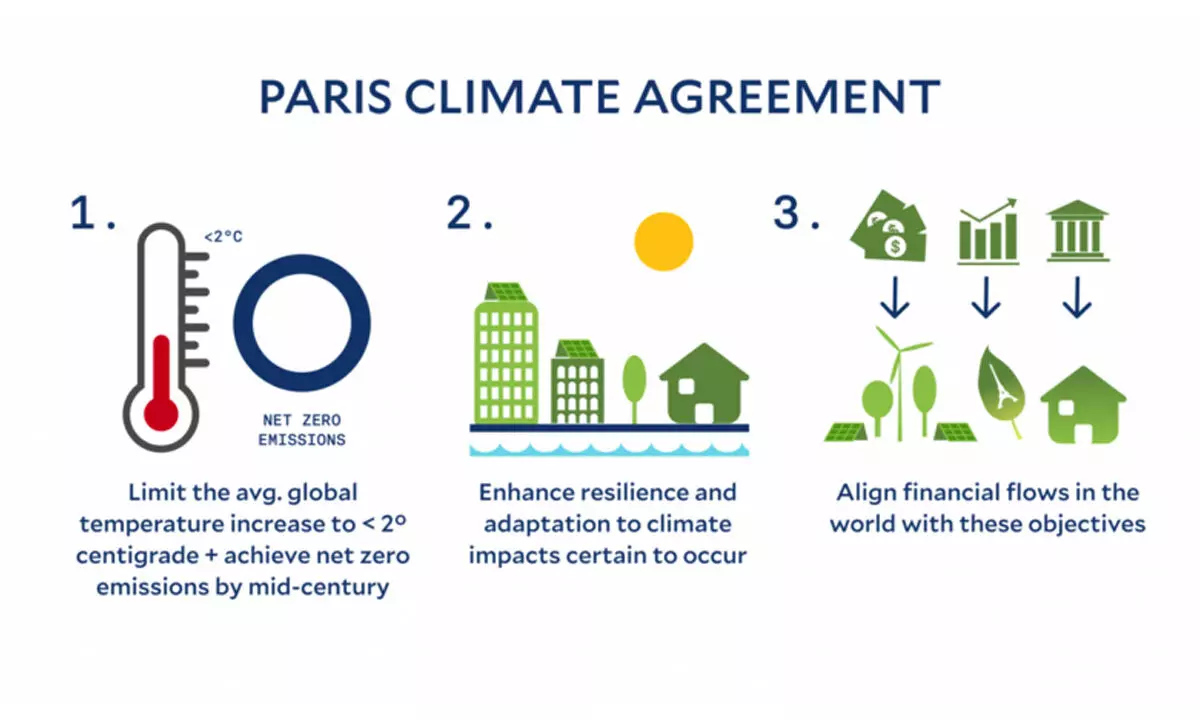Paris Pact key to avert climate catastrophe

The Paris Agreement on climate change was adopted about 8 years ago with an aim to limit the average global temperature rise to well below 20C above pre-industrial levels and to pursue efforts to limit it to 1.50C.
The Paris Agreement on climate change was adopted about 8 years ago with an aim to limit the average global temperature rise to well below 20C above pre-industrial levels and to pursue efforts to limit it to 1.50C.
A study by the World Meteorological Organisation corroborate the Intergovernmental Panel on Climate Change (IPCC) report, stating that the average global temperature on Earth has already increased by at least 1.10C, and the temperature rise of 1.50C can occur by 2027.
UN chief António Guterres warned that the world is currently “way off track” meeting either the 1.5°C or 2°C targets of the Paris Agreement. And the world is facing a “hellish” 30C of global warming by the end of the century if the current trend continues.
At the current level of warming of 1.10C, number of extreme weather events have occurred in the world recently including a record- breaking heat waves in Europe & across Asia, wildfires ravaged in several regions of United States & Canada, ice storms in southern United States, floods in India
According to IPCC at 1.50C of warming, about 15% of the world’s population will be exposed to severe heatwaves and at 20C, 61 million more people could be exposed to severe drought than at 1.50C and 50% more people may face water stress. Ocean warming, sea level rise and habitat loss for plants and animals could be significant. There could be more heat related deaths, vector borne diseases and food insecurity, greatly affecting human health and lively hoods.
If the average global temperature rises above 20C, it could lead to a range of catastrophic consequences. Heatwaves, droughts and heavy rainfall events could become intense and more frequent. Melting of glaciers and ice sheets, water scarcity, food insecurity and crop failure, extinction of many plant and animal species, spread of diseases etc.
The Paris Agreement stipulates that the parties are required to submit their nationally determined contributions (NDCs), which are their plans and actions to reduce greenhouse gas emissions and to adapt to the impacts of climate change. As of October 2022, 193 countries have submitted NDCs.
According to IPCC, the greenhouse gas emissions must peak by 2025 to limit global warming and then reduce by 43% by 2030. But the current NDCs are not sufficient to achieve them.
The Paris Agreement reaffirms the ‘International Climate Finance’ i.e. the obligations of developed countries to provide financial resources to developing countries in implementing emission reduction efforts and adapt to the impacts of climate change. But the $100 billion made by advanced countries in 2009 at the Conference of Parties (COP 15) held in Copenhagen, has not been fully delivered.
Developing countries also need access to technologies and knowledge for transition from fossil fuels to low-carbon energy and climate-resilient development. But there are barriers such as intellectual property rights, trade restrictions in technology transfer from developed to developing countries.
According to analysis carried out by the Scientific analysts Climate Action Tracker (CAT), less economically developed countries are struggling most to combat the effects caused by a few richer countries – China, USA, Russia, European Union – which are not doing enough to combat climate change.
The Paris Agreement is legally binding in the sense that it is limited to submitting NDCs by countries and to report the progress of implementation. It does not impose economic or political penalties such as fines or embargoes for non- compliance of NDCs or mitigating actions. Hence countries may not act fast and adequately enough to mitigate or adapt to climate change and developed countries continue to shirk responsibility in climate financing to developing ones.
The private sector plays a vital role in implementing the Paris Agreement in providing finance, innovations, and technology support for substitution of fossil fuels by renewable and low carbon energy. In turn, it can benefit from new opportunities created for their business. Governments need to facilitate their participation.
While mitigation and adaptation are essential strategies, people’s contribution and cooperation are equally important in addressing climate change. Individuals can contribute by reducing their carbon footprint, increasing carbon sinks, supporting adaptation and resilience etc.
The Paris Agreement is expected to be a key topic of discussion at the COP 28 being held from November 30 to December 12 in Dubai. The conference needs to bolster climate action and reinforce it as a global cornerstone. After stocktaking the progress made so far, the Conference must encourage countries to take appropriate climate actions to keep the temperature rise below 1.50C. It should also make sincere efforts to operationalise the International Climate Financing. In all these cases, developed countries, should be persuaded to do what is required. Otherwise, the Agreement continues to remain dormant and the world can be heading towards “Climate catastrophe” as warned by the UN.
(Writer is a retired
scientist, CSIR)














